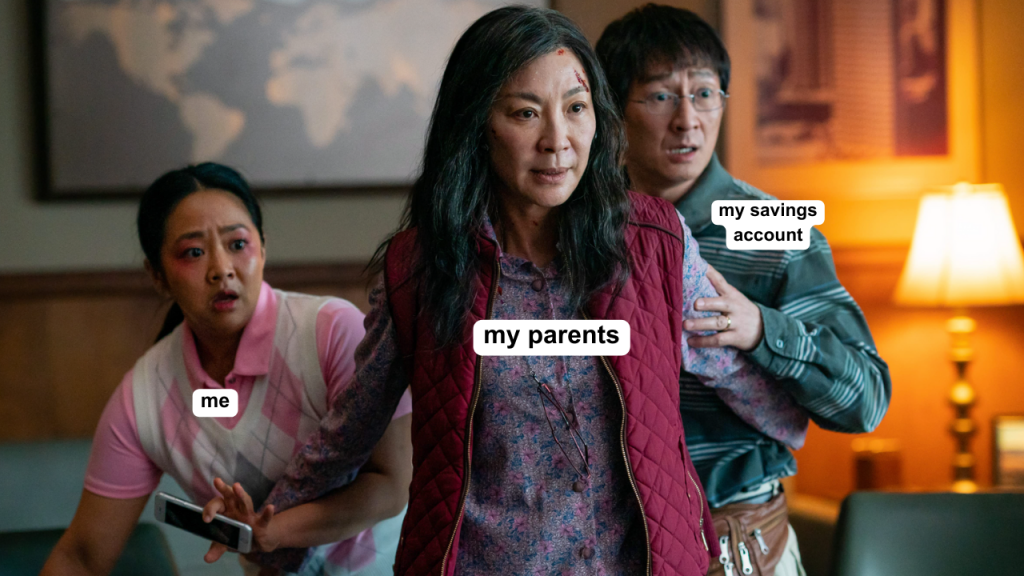
The casualties of the cost of living crisis are wide-ranging, from our beloved pub chippies, to Christmas celebrations, to actually being able to afford your own place. More and more young people (and even people who aren’t so young!) are choosing to move back in with their parents amidst our ongoing housing crisis and soaring costs of, well, everything. Here’s their advice on how to cope with a decision that’s proven to hurt their mental health just as much as it’s helped their bank accounts.
The amount of young people moving back home has increased sharply, but research has shown these numbers also spike for people who live outside of major cities, older adults, and women in their thirties.
One study found that, for people who chose to live with their parents again because they could no longer afford to live on their own, moving back home was linked to poorer mental health. Unsurprisingly, young people living with parents outside major cities, those on a low income, or those who also have a partner living with them at their family home reported the poorest mental health.
Mads, 26, and her fianceé decided to move back in with Mads’ parents given the state of the unstable nature rental market.
“I feel like my autonomy and independence has been wildly impacted,” she told PEDESTRIAN.TV.
“Popping out to run errands I always get asked what I’m doing, when I’ll return. Or if I need a mental health day off of work, I will without a doubt be questioned by a parent and likely judged, if they are home.”

Mads said the added pressure of having to be “in the middle” of conflict between parents and a partner is also a challenge, a sentiment echoed by Sarah, 31, who found she had to mediate between her parents.
“I found that I was often stuck in the middle of their fights and some dynamics reverted to something similar to my childhood,” she said.
“Like they would treat me like a child somewhat and I had to remind them that I was an adult. Their relationship is incredibly toxic and I felt like I started to wear the weight of that a lot.”
Maria, 24, felt the lack of privacy and agency was a driving factor in her mental health declining when she was forced to briefly move back home during the pandemic.
“It was difficult to give up the independence I desperately clawed for myself,” she said.
“Someone will criticise you for staying up or sleeping in. Minimise every feeling you have and claim if only you went outside and had a proper sleep you’d feel better. Having zero privacy to call your partner or even take a zoom meeting. The constant comparison between you and where your parents were at that point in life. And just the overall feeling of crushing failure that you had to come back home to sleep on the couch.”
Others also reported feeling a sense of failure at not being able to live outside of home at their big age.
“I feel less independent and a little bit like a failure, if I’m honest. My social life is suffering, due to my mother living a couple of hours away from where I used to rent and where my friends are,” Chantelle, 32, said.
How can you make moving back in with your parents more bearable?
So, it’s generally agreed that living with your parents can really suck at times — no matter how grateful you are for the financial support.
Here’s some sage advice by people who survived moving back home and have figured out how to manage it.
“Use this time to save up as much as you can, spend time doing things you enjoy (after work I like to go gym, go for a walk, see friends) and try to strengthen the bond with your family.”
— Mariam, 24
“Do not feel guilty about spending heaps of time in your room if you need to do that. It’s normal to need space from your family, just like you’d need space from housemates if you lived in a share house. Also, pick your battles. I think you’ll know what you can just let go and what you can pull them up on and say ‘hey, that’s not okay, let’s find a better way to communicate’.”
— Sarah, 31
“Try and focus on the good parts of being back with your family — it might be the last time you all live together like this.”
— Jane, 34

“Make the most of your closest friends, if they are willing to have you over for dinner one night a week between the people you have in your life, you’ll survive.”
— Monica, 27
“If you need a break just make up a stomach issue and lock yourself in [the bathroom] for an hour. Remember that they do love you, you’d just love them better from a different suburb.”
— Maria, 24
“Create boundaries if you can (I asked my parents to message me at night if they needed to speak instead of coming to my room). Have dedicated time you spend with family and then allow yourself to do your own thing outside of that. Stay in contact with friends and see them regularly! You’re saving money living at home so allow yourself to spend a bit on a nice dinner out with friends, etc. Also, make sure to show gratitude to your family. I know it’s tough but they’re also probably finding it difficult. I feel very lucky to have a family willing to take me in and I tried to show them that.”
— Keelin, 25
“Living with my migrant parents has been heavy mentally as it feels like I am 13 years old again. My parents struggle with boundaries and setting them and ensuring they are respected takes its toll. Communication is key, and sharing the responsibilities amongst the household.”
— Marlene, 35

“Boundaries are super important, as well as clear expectations from all parties. It can be such a struggle with the financial power dynamic of living with parents. Definitely have safe spaces that you can comfortably live in, for example, having a TV or laptop in your room/study. And finally, have things to look forward to, even if that’s a very budget friendly camping trip.”
— Mads, 26
“It can help to be kind to yourself about the realities of why you’re home. Factors that are out of your control, are out of your control. Remember that the usual societal expectations of home-owning timelines are shot to shit for younger generations.”
— Chantelle, 32
“It’s not a shameful thing to move back in with your parents, it’s a reflection of a failed society, not a failed individual. We shouldn’t accept that this is how things are, we should fight wherever we can for change.”
— James, 25
As James and Chantelle said, having to move back home is not a reflection of you and your success, but a result of a tough economic climate that is out of your control. Be fair and kind to yourself, you got this.
The post Moving Back In With Your Parents? Here’s 10 Survival Tips From Young Aussies Who Already Did It appeared first on PEDESTRIAN.TV .







